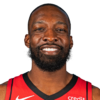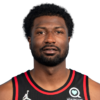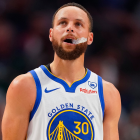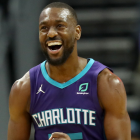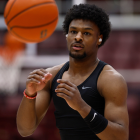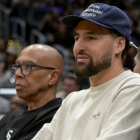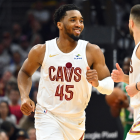This year's spending spree was unlike anything the NBA has ever seen. In free agency, Memphis Grizzlies guard Mike Conley signed a $153 million contract, the largest in league history, and it wasn't even surprising. The unprecedented influx of money from the new television deal with ESPN and TNT means that player value should be seen in much different terms than before.
It would be wise to pay more attention to yearly salary figures rather than the massive totals. If you're really serious about understanding these contracts, you should think about them as percentages of the salary cap. Even if you do these things, though, there were some deals that stood out. At best, these are bold moves; at worst, they are obvious misfires. Here are 10 players who probably got a lot more money than they should have:
At Anderson's introductory press conference, Rockets general manager Daryl Morey called him the best floor-spacing power forward in the league. That is accurate -- he is deadly when left open, and defenders respect him on the perimeter as much as just about anyone. He'll help Houston immensely -- on offense.
The question is whether the team can cover up for Anderson's defensive deficiencies. He has never been even average at defending the post or the pick-and-roll, and now he's playing in an era where 4s are expected to switch onto guards. The Rockets gave him four years and $80 million, and they were 20th in defensive efficiency last season. Houston has to make other moves to make this a successful partnership.
It was clear that Turner had played himself into a raise during his two seasons with the Boston Celtics, but seeing him get $17.5 million per season was still a bit shocking. The Blazers were reported to be offering a max contract to Chandler Parsons, and when he took the same deal to join the Memphis Grizzlies, they quickly turned their attention to Turner. It is clear that Portland wanted another playmaker on the wing, but he is not necessarily the one they needed.
In Boston, Turner found his niche because of his ability to create offense and guard multiple positions. He'll still do that in Portland. The difference is that he's going from a team that was starved for ballhandlers to a team that has two excellent ones in the backcourt. This contract would look a lot better if he was a reliable 3-point shooter.
Sorry, Portland, this looks like another overpay. It would be great if the front office was able to sign someone who combined the best parts of Turner's and Crabbe's games, but instead they invested heavily in both of them. Crabbe signed a four-year, $75 million offer sheet with the Brooklyn Nets, and the Blazers matched it. While it's understandable that they didn't want to lose a 24-year-old 3-and-D guy, it's hard to justify that kind of money based on his production so far.
Portland drafted Crabbe No. 31 overall three years ago, and for his first two seasons most of his work was done behind the scenes. After watching him become a crucial part of the rotation, the front office probably couldn't bear to imagine him getting even better in another uniform. Now, though, the Blazers need him to improve when it comes to consistency, playmaking and rebounding. They have made a big bet that he will.
Next month, Green will turn 30, so everybody has finally stopped talking about his potential. For years, he was a divisive player because he looked like he could be a star but did not play like one -- except for those occasional games where he did.
Every now and then, Green will have an offensive explosion. Most of the time, though, he's just another role player who does everything adequately but nothing that well. If he could be counted on to make 3-pointers and slow down opposing scorers every night, then he would have found a long-term deal. Instead, he took one year and $15 million from the Magic, who clearly wanted veterans as they try to become a playoff team. When you look at his tools, it's still weird that he hasn't produced like, say, Marvin Williams.
I'll gladly play devil's advocate on this one: If Mozgov performs like he did when fully healthy in 2014-15, then paying him $16 million per season isn't ridiculous. When he arrived in Cleveland, he was exactly what they needed: an enormous, mobile big man who could rebound, protect the rim and finish off of pick-and-rolls. The Lakers could use someone like that.
The problem is that they gave him four years, he turns 30 in two days and he's coming off a season where he was significantly worse in just about every statistical category. By the end of the year, he not only lost his starting job, he lost his place in the rotation. The Cavs were much, much better when he was not on the court. Los Angeles better be sure that this was an injury-related anomaly, especially when guys like Cole Aldrich, Festus Ezeli and Zaza Pachulia signed for so much less.
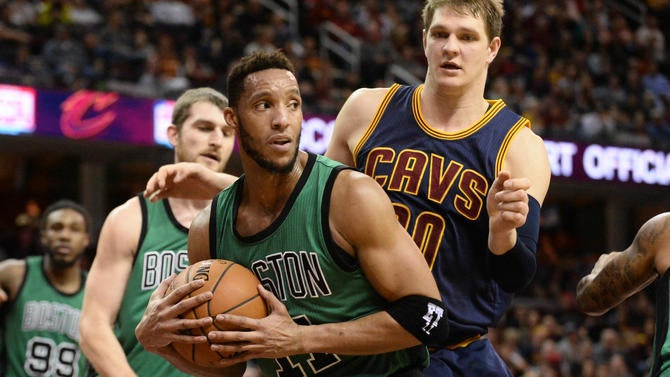
Again, the rebuilding Lakers had to pay a premium for a veteran. Deng could have gone elsewhere and won more games, but instead he will assume a leadership role on a team that badly needed some adults in the locker room. For $72 million over four years, it's an understandable choice.
Los Angeles needed to take steps to become a more well-rounded team, and it was always going to spend money this summer regardless of whether or not it could obtain a star. The problem is that, with Deng and Mozgov on the books until 2020, the Lakers have now sacrificed some future flexibility. Deng will absolutely help them next season, but they could regret this deal when he's 34 and they're still paying him like this.
It turns out Barnes didn't cost himself any money in the Finals. The Mavericks gave him a max deal -- four years and $94 million -- just weeks after all those bricked 3-pointers. This was a risky move.
At 6-foot-8 with the strength to defend 4s and the quickness to stick with 1s, Barnes was important to Golden State's defensive system. He usually fit in well on the other end, too. Coming out of college, though, Barnes was not supposed to be just a complementary player. This signing indicates that Dallas believes he can grow into a much larger role.
For a little while, it looked like Crawford was going elsewhere -- the Clippers reportedly offered him a less lucrative contract than Austin Rivers when free agency began. Then, suddenly, the 36-year-old was back on a three-year, $42 million deal.
Crawford has won two Sixth Man of the Year awards in the last three years, but this deal was somewhat surprising. The streaky shooter is coming off two seasons where he shot 40 percent, and he's a defensive liability. Without other appealing options to improve the team, though, the Clippers appeared to settle for what they knew, even if the price was a little high.
For years, the Pelicans have tried to find a long-term solution at small forward. They think they have found one, and he averaged 4.2 points and 2.8 rebounds last year. While per-game numbers can be deceiving, this was the kind of signing that some fans were upset about -- mostly because they had never really seen him play.
Hill was fantastic for the Pacers at the end of the regular season and in the playoffs. He credibly played power forward and he confidently swished 3-pointers. If he can build on that, New Orleans will be fine with the contract, but he does not have much of a track record in the NBA. The team is essentially paying him $48 million over four years because of one month where he showed improvement.
It feels wrong to have a future Hall of Famer on this list, especially after seeing him dominate some postseason games. Most nights, though, Wade did not play like a $24 million-per-year player.
Well, in some ways he did. Like the Wade of old, he had the ball in his hands all the time, took tough shots and made some big plays in big moments. The problem is that, at this stage of his career, he has been a minus defender and a relatively inefficient scorer. No one has any idea how he will look next to Rajon Rondo and Jimmy Butler, but there are reasons to be concerned.



